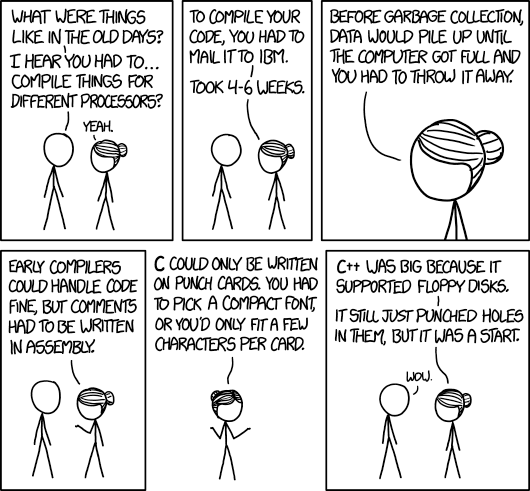1980 freshman year, McHenry Illinois, I was in a sophomore math class where our teacher gave us homework a month at a time. Second week of the second month he had to do something, so told us to work on homework. Midway through the class he walked around to see if anybody was needing help and questioned why I was working on my english paper instead of math. So I pulled out my completed math homework for the month, including stuff we hadn't covered yet. He took me into the math teachers' office, showed me a Commodore PET, gave me the BASIC manual, and said have fun.
Following summer I was working at my grandparents' place in Wisconsin to save up money for a TRS-80 CoCo. We went into town and grandma wanted to see this new-fangled thing I was saving up for, so we stopped in at a Radio Shack. Display model had no power, so I asked the guy if he'd power it up. He flat out lied to me -
"there's a password that I don't know, and if I type it wrong it will destroy the computer". Soured me on my plans for the CoCo. Soon after I learned about the VIC-20, which I ended up getting instead. It turned out to be a much better fit since I was already familiar with the PET.
We moved to Portland Texas summer of 82, where I was introduced to BBSes. I ended up writing one for my VIC, which I eventually ported to the 64 and the 128. My BBS software worked hand-in-hand with my custom MusicTerm software for real-time music at 300 baud, on the fly font-changes, sprite usage, you could play games online with your joystick, etc. More on that in
my blog entry.
I was porting my BBS software to the Amiga when I discovered the internet at the University of Houston, and soon after lost all interest in the BBS scene.
My first IT job was at a healthcare company on a Wang VS, which led to my next job at an electronics manufacturing company, which also had Wang VS systems. They eventually migrated to an AS/400. My job after that was another manufacturing company where everything ran on Windows servers. My current job is in the space industry, working on Windows software used to design spacecraft.
As a hobby I write homebrew games for the Atari 2600. It's unlike any console out there - only 128 bytes of RAM, not enough for video RAM so its
video chip is scanline based - you must update the registers scanline-by-scanline in real time to create the display. My finished games are
Medieval Mayhem (Warlords), Stay Frosty (an original holiday mini-game in
Stella's Stocking),
Space Rocks (asteroids), and
Stay Frosty 2(original). Under development I have
Draconian (Bosconian),
Frantic (Berzerk/Frenzy), and
Timmy!. Timmy!'s a Jumpman inspired game that was originally going to be one of Think Geek's
"April Fools - no, it's actually real" products like the
iCade and
Tauntaun sleeping bag ended up being. Sadly that fell apart due to management shakeup they had, but I intended to finish it someday without the ThinkGeek theme.







